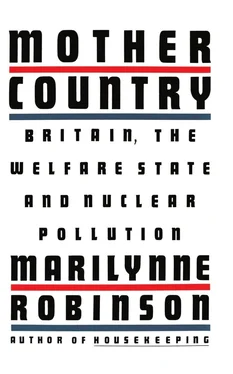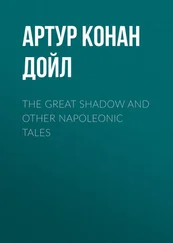I am aware that the situation at Sellafield raises a great many questions as to how and why such a thing should have come about. But the fact of the plant’s existence and operation is not disputed — it can be confirmed by anyone in America who cares to spend a few hours in a fairly good library looking at British publications. The mystery is not how a phenomenon of this importance can be concealed but how, being, as it were, a city on a hill, it has remained unknown to us for so many years.
There are certain questions I have not attempted to answer. The first of these concerns the role of the American government in this enterprise. If it has no role, then it is virtually alone among the major Western governments, most of whom use the plant’s services. There is mention in some British sources of a barter arrangement in which between 1964 and 1971 the United States received Sellafield plutonium in exchange for nuclear materials produced in America. This in itself means little. The fact that Britain produces plutonium as part of its role as a nuclear weapons state is no secret, nor is it ever surprising to find ourselves and the British tinkering at these projects together. The question is whether the American government has encouraged the operation of Sellafield, an unaccountably foul enterprise, even by the debased standards by which such things are judged. I am troubled by the thought that the United States must have a satellite or two sensitive to concentrations of radioactivity, and that the contamination of the world’s hottest sea cannot have gone unremarked. The Soviet Union must also have means to detect radioactivity in significant quantity. And presumably it would be to their advantage in the battle for hearts and minds to point out to the people of Europe how they are being poisoned, especially if there is a significant American involvement. The silence in which Sellafield prospers is a little uncanny. It suggests interests are being served that are neither ideological nor national.
The most plausible hypothesis, I suppose, is that individuals who do not feel any kind of loyalty to the future have been corrupted by the quantities of money involved. This is only speculation. But the currency that passes in nuclear transactions tends to be denominated in millions and billions, and the industry worldwide is protected by secrecy and by its significance in maintaining the prestige of governments and by its military significance, whether as licit or illicit supplier of fissile materials or as potential target. Only assume the usual human slovenliness and venality and an important degree of corruption will seem quite probable.
The nuclear industry enjoys the respect generally accorded to science, because its workings are abstruse. Everyone knows that it is impossible to predict or to describe the impact of this industry on the planet, that it is persisted in despite its demonstrated potential for disaster, and that, if it were closed down tomorrow, even assuming everything goes well for the next score thousand years in controlling the virulent materials it will leave behind, its economic cost to future generations will utterly dwarf whatever value it has had for our own. Yet despite all this the nuclear enterprise is accorded sufficient respect to make the suggestion that its development might to some degree reflect ordinary corruption seem a little impolite. It is as if money and secrecy brought out the best in human nature, changing politicians and technicians into Carmelites.
But Sellafield, if it existed in isolation, would be sufficient proof that the world’s interests have not been properly respected. As evidence of culpability, it is not a smoking gun so much as a hail of bullets.
Objections are made to Sellafield’s operation by governments within Europe. Denmark and Ireland, whose small terrains are increasingly affected, protest vehemently in the European Parliament. Other countries join with them. But this is disingenuous, since these other countries — unlike Ireland and Denmark, who have no nuclear power plants — patronize Sellafield. They pay Britain to take on their waste disposal problems. Their indignation tends to obscure the simple fact that European wastes are poured into the European environment, day after day, as the result of those same methods they deplore, and that the operation of the plant is profitable because they pay Britain to transform wastes from these countries into reprocessed plutonium, and uranium, and all the varieties of contamination for which Sellafield is renowned. And they pay Britain to store wastes while new reprocessing facilities are built at the site, or until sea dumping, if it has been stopped, is resumed. Circumstances demonstrate that it is politically possible in Britain to do these things, flagrantly damaging as they are to the national and the world environment. Circumstances prove also that the superior environmental standards of other countries are shadow play, since toxins are turned over to Britain to be dispensed with by methods these same countries deplore so loudly, the consequences of which are already being felt by their own populations. The efficacy of respective European environmental movements can be established from the fact that Sellafield is in Britain, and that German, Italian, and Scandinavian wastes are at Sellafield and in the waters off the European coast.
There is an analogue for Sellafield in the disposal industry that has developed in Britain for non-nuclear toxic wastes, which are shipped into the country and then disposed of in the variety of ways the laxity of law makes possible — left in municipal dumps or poured into the North Sea or buried on derelict land in poverty-stricken northern regions—40,000 tons of lethal waste being imported in 1986. 1What little fastidiousness is reflected in other countries’ hiring these services merely makes it profitable to the British government to leave its environment undefended. The arrangement creates an incentive for employing the crudest means of disposal — for which Europe and the world will suffer in due course.
All this raises the question of the role of environmental groups. People in this country have felt for some time that Greenpeace, Friends of the Earth, and the Sierra Club, as well as scientists’ organizations, were keeping watch over the greater environmental issues, at least to the extent of making them known to us. Sellafield is the world’s largest source of radioactive contamination. It is also the greatest commercial producer of plutonium in the world — a role disturbingly at odds with any notion of non-proliferation. It is the center of a worldwide traffic in toxic and explosive materials. And it is the site of the largest construction project in Europe, because it is expanding. The release of radiation from Three Mile Island is usually estimated at between fifteen and twenty-five curies of radioactive iodine. Many hundreds of thousands of curies of radioactivity have entered the environment each year through Sellafield’s pipeline and its stacks, in the course of the plant’s routine functioning. In other words, Three Mile Island was a modest event by the standards of Sellafield and, even if disaster had not been averted, would have made no comparable impact on the earth’s habitability.
Yet, though Greenpeace is deeply involved with Sellafield in Britain, even to the extent of having supposedly placed a mole inside the plant, information about it in the United States is extremely limited and of poor quality. The plant is located in England’s largest national park, which includes the Lake District. Tourism is an enormous industry there. It seems to me indecent that people are not warned away from this uniquely contaminated environment.
The British government cannot be expected to show foreigners a solicitude it does not show its own people. But the American government cannot be excused for allowing its nationals to be unknowingly exposed to pervasive contamination — for example, to breathe air in which concentrations of plutonium are sometimes higher than they are within this old, disreputable plutonium factory itself.
Читать дальше








![Nicholas Timmins - The Five Giants [New Edition] - A Biography of the Welfare State](/books/701739/nicholas-timmins-the-five-giants-new-edition-a-thumb.webp)



